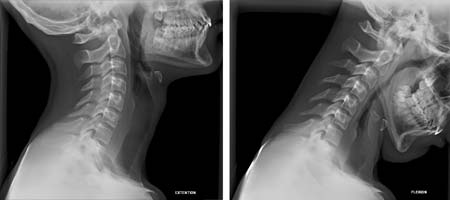The day’s clinical case presented in anatomy lab was that of a 40-year-old male who had dislocated his sixth cervical vertebrae in a surfing accident. Upon arrival at the hospital, he had suffered full paralysis from the neck down but was still conscious and alert. He and his wife were told that surgery would be needed to repair his broken neck, but that the chances were very slim that he would ever regain the functions he had lost due to the injury. The last page of the case was an X-ray image of the man’s vertebrae fused with screws and plates realigning his spinal cord. His prognosis was left to the students’ speculation. We returned to the classroom to debrief the case.
As a group, we discussed the grim injury in all of its anatomic and physiologic glory. Guest surgeons explained the gravity of the man’s situation and the devastating symptoms with which he presented. The case ended as they all do: we hoped for the best for our fictional patient but understood the assumed permanence of an injury of this type.
There was a long pause before Dr. Payer said, “Would you like to meet him?”
Shocked, we all turned to the back of the room where Dr. Topping was opening the door for our patient – would he be in an electric wheelchair? Would his body appear atrophied and weak from years of paralysis? How would he get down the steps in our classroom?
A strong, unfamiliar voice echoed from the front of the classroom. “Hi, everyone.”
We turned around to see who could be distracting us from seeing our patient come through the door. It did not take long for us to all realize that the man standing before us on two perfectly healthy legs, holding a microphone with two fully-functioning hands, with zero sign of ever having suffered a devastating cervical subluxation, was our patient. All 120 of us gasped in unison. It was an incredible sight, an absolute medical miracle. When you spend your days studying everything that goes wrong with the human body, it is amazing to see something that went right−the experience had me in tears.
He filled in all the gaps of the case and explained the details of his injury and his recovery. He talked about his physicians and surgeons and how he had ran the Turkey Trot just two months after his accident. Then, his best friend who happened to be a physician at the hospital to which he was flown told us the most important factor in his return to normalcy: when everyone else had lost hope, he never did. He refused to accept a prognosis of permanent paralysis. He refused to accept the possibility of an unsuccessful surgery. He never gave up on his body, so his body never gave up on him.

This story is, of course, rare. And yet, it speaks volumes about the power of the human spirit. As a medical student, I will be one of the last people to refuse credit to the nurses, physicians, paramedics, and surgeons who undeniably saved this man’s sense of a normal life. But I also know firsthand what happens when you give up. Keeping hope does not mean you automatically win the battle. But the alternative guarantees a loss.
It is a concept that I have been battling with since I began medical school. As a pre-medical undergraduate student, I had nothing but the utmost confidence in myself. I saw myself receiving my white coat. I saw myself as a doctor. Of course, I had my doubts – especially around application season. But even on my darkest days, I knew I could get to medical school. I made it, and in the process, have lost all confidence in myself. I feel as though I am the only one who does not believe in my ability to succeed. I feel like a fake, an imposter; as though I’m floating through a movie scene just waiting for someone to yell “CUT!” Perhaps it is because the next step is actually being a doctor. The next step no longer involves passing a module exam and meeting research deadlines. The next step involves real people, real families, real life, and real death.
And yet, I could not feel more at home. There is really no place else I would rather be. But I still fall asleep every night to a lullaby of forced distraction as my mind tries to convince me that I cannot do it, that I will not make it through, and that everyone else has such a better handle on life than do I. And once you lose hope, no amount of distraction can help you fall asleep. Give up on your mind, and it will give up on you.
Featured image courtesy of Mark H. Anbinder


